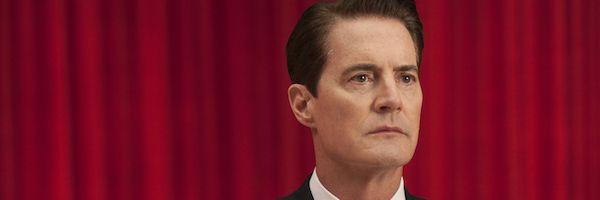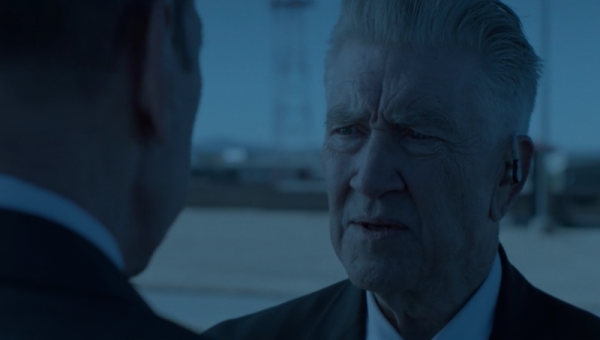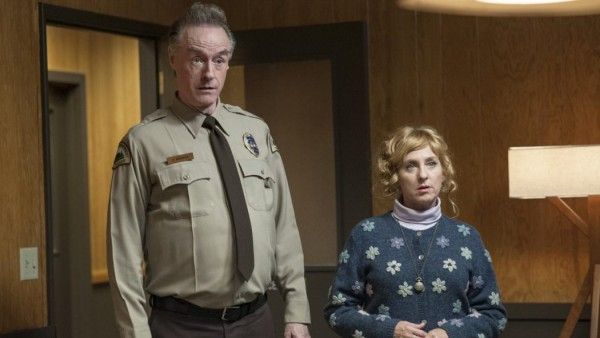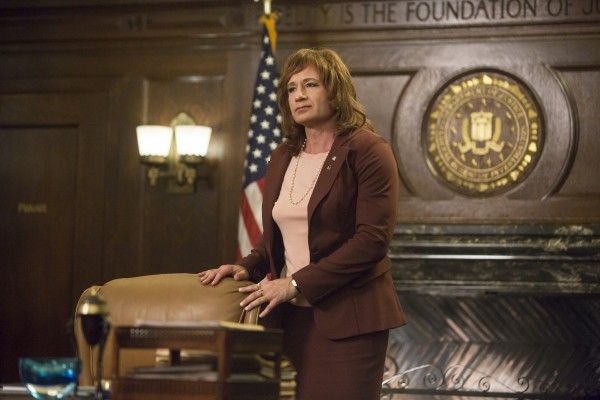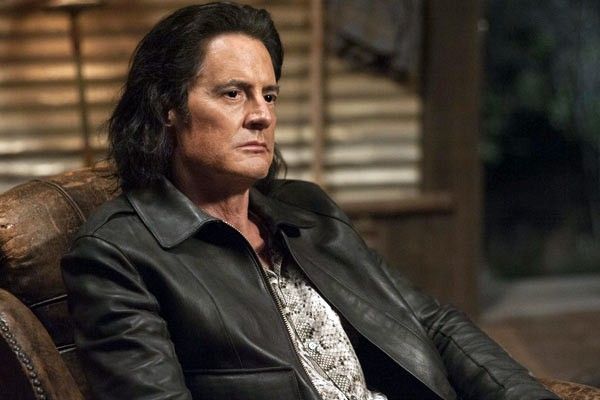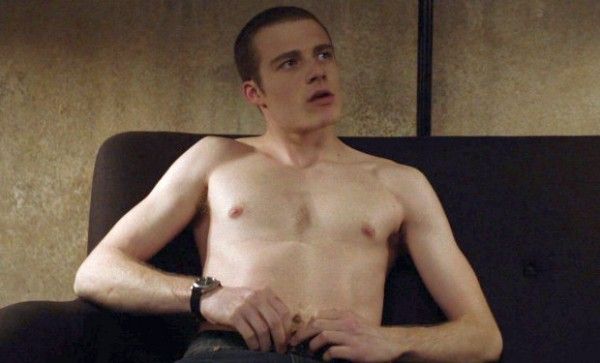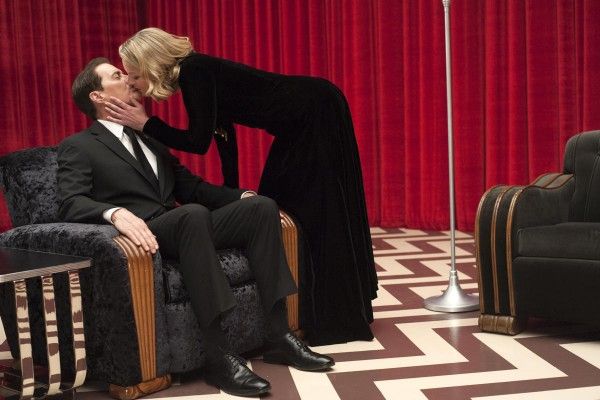It's tempting to go through these latest episodes of Twin Peaks looking for scraps of images, artifacts, and sayings that recall David Lynch's series' first two exemplary seasons and the wildly undervalued, masterful Fire Walk With Me. For instance, if one were to take a deep enough dive into the third episode of Twin Peaks' return season, one would find the Owl Cave ring that made Laura Palmer's arm go numb as well as an appearance from Ronette (Phoebe Augustine), the young woman who was taken around the same time a Palmer in the show's first season. There are other moments that similarly recall Lynch's past work in Parts 3 and 4 of the Showtime series but none of them crack whatever case Lynch is working on here. Indeed, much like those who have become obsessed with hunting down and pointing out Coen references in FX's Fargo, it's unclear what this does to enrich the experience of watching Showtime's Twin Peaks, beyond being able to prove your (almost entirely inconsequential) encyclopedic knowledge of all things Lynch.
Perhaps obsessively picking up all these references comes from a wanting to get ahead of what the show has been giving us in the first four hours, to fuel some absurdly intricate roadmap to Lynch's world that will never, ever accurately match what happens. This tendency has been popularized by Game of Thrones, Breaking Bad, and even the holiest of all grails, The Sopranos, but also from Fargo, The Americans, Mad Men, Justified, and a lot of other shows that I don't watch regularly like Riverdale.
On the whole, it's just harmless fun, but it's increasing popularity also suggests an unnerving, overriding obsession with narrative structure and plot building in TV, as well as a relative indifference to style, editing, pacing, and composition. Those elements may seem dry and I may be risking turning into a bitter 40-year-old film-school professor but they are of particular consequence when talking about the latest episodes of Twin Peaks and Lynch, who will not suffer fan theories and doesn't enjoy explaining his enigmatic style to anyone. When Agent Dale Cooper ends up atop the small iron box floating in space, where he has been sent from the Black Lodge, he sees a vision of Major Briggs (Don S. Davis), who says "blue rose" and vanishes. The special effect of the friend's enlarged, translucent head appearing in the middle of space is unpolished in an entirely unmanaged way. The look of the effect could have been passed off as amateurish even, but this tactic speaks to the warped, untidy feeling that Lynch has for memories. Memories are not perfect recollections but rather funhouse-mirror reflections of the objective events, if such things even exist.
These are the bits that continue to separate Twin Peaks from the glut of modern television, even as Lynch began to delve into a more familiar suburban landscape. Much of the third episode involved Cooper escaping from the limbo-like existence, an eccentric transition to the living world as we know it that is similarly simplistic and unpolished in its visuals as the "blue rose" moment. This ended with Cooper possibly entering two other versions of himself: the bad man that we got acquainted with in the first two episodes and workaday schlub Dougie (MacLachlan again). The latter vomits up a solid chunk of something before he is replaced with Cooper, and evil Cooper barely contains streams of yellow-black bile before he passes out and is taken into custody by the South Dakota Highway Patrol. It's kinda juvenile and gross but it's also incredibly convincing that this would be exactly the human body's response to one's soul being infiltrated or replaced. For whatever the general feeling of being off-kilter in Lynch's world, and watching Cooper displaced in the role of Dougie adds to that feeling, there's always been a strange and strangely empathetic logic to his worlds.
The third episode ends with Dougie about to bankrupt the casino by following visions of the Black Lodge to different slot machines, where Dougie is awarded several dozen grand prizes. This does not seem all that different to how Lynch gets the money for his projects but there's some real tension in knowing that Cooper is lost as Dougie, incapable of reasserting himself into the known world again. There's a sadness to the vacant, bumbling character who can make money but would have no idea how to spend it, but Lynch also allows for humor. The hitman that we see about to kill Cooper when he leaves Dougie's open-house bungalow aren't part of some larger plot to take out Cooper but rather agents of a local loan shark who Dougie is in deep with when Cooper takes over his life. There's also the magnificent morning-routine sequence, soundtracked by Dave Brubeck's immortal "Take Five," which may have been the best scene of the series thus far.
Watching Cooper play domestic with Naomi Watts' relieved wife is a beguiling experience, aided by Lynch's sparse, disquietingly mundane aesthetic. The emptiness of Cooper's existence lingers throughout but the engine of the fourth episode were scenes back in the titular town's sheriff's office, as well as following along with the killing of Sam and Tracy by the monster in the glass cage as it arrives at the desk of FBI Deputy Director Gordon Cole (Lynch himself) and Agent Rosenfeld (the late Miguel Ferrer). Back in Twin Peaks, Robert Forster's Sheriff Truman arrives at work finally and gives an immediate, rousing sense of command to the office, one that seems more dreamy and aloof when Hawk and Andy are left alone. And in sticking with Lynch's ability to balance the comedic with the ruminative, the scene with the eaten chocolate bunny was a total gas.
Sadly, Forster's most memorable scene - the extended exchange between him and Michael Cera's Wally Brando, Andy and Lucy's son - felt at once purposefully strained and meant largely to explain away the absence of the original Harry S. Truman. It's great to see the office in working order, but a lot of what goes on in these scenes still feels like setting the plates for the world's weirdest dinner party that has yet to get underway. This is even true of Gordon and Albert's trip to okay their assignment from David Duchovny's Denise, now their superior, and interviewing the evil Cooper in a South Dakota lock-up. For all the grand, terrifying, and cheesy images that Lynch unleashes in parts three and four, there's a slight feeling of trepidation in both episodes about moving forward from Cooper's search for identity. Thankfully, there's no telling what Lynch will do next, and that gives him a special kind of visual and narrative power in this realm.
Rating: ★★★★

